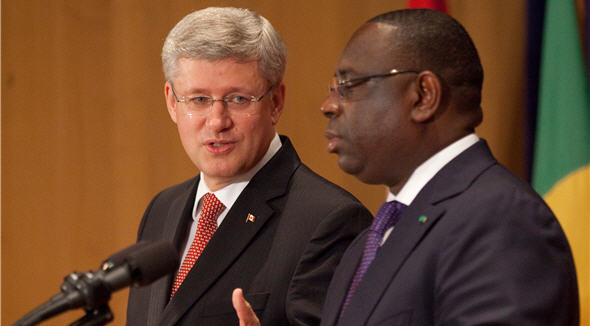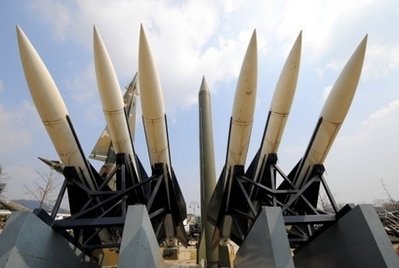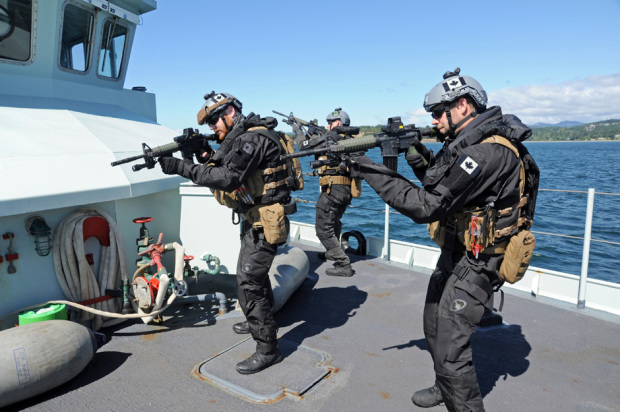Prime Minister Stephen Harper wrapped up a two-day visit to Senegal on October 12, his first trip to Sub-Saharan Africa since attending the 2007 Commonwealth Summit in Uganda. Although the official state visit seemed to be an aside to the 14th Francophonie Summit in Kinshasa, DR Congo, the decision to renew investment and development cooperation in Senegal comes in the aftermath of the successful Libyan intervention by NATO forces. In what UN officials in West Africa are calling ‘a significant and worrying ripple effect’ of the Libyan conflict, well-armed Tuareg fighters returning home to northern Mali—now effectively an autonomous state controlled by Islamist militants—have spread fears that the Malian conflict could take hold of the wider region. In one of the largest expansions of Islamic militancy in years, groups linked to al-Qaeda seized all of northern Mali in May, an area the size of Texas, after a military coup in Bamako, the Malian capital. Largely taken by surprise world leaders pondered what to do for months before finally opting for military intervention. The Economic Community of West African States (ECOWAS) is now preparing to deploy 3,000 troops to the area in the hopes of retaking the north.
“This is a serious challenge, a serious threat to security for Mali, but it goes beyond Mali, because indeed it’s a serious threat to security in West Africa with risks of spill over across the region,” said Said Djnnit, special representative and head of the UN’s office in West Africa (UNOWA).
Elevating security concerns in the Sahel, a vast arid belt of land marking the border between the Sahara Desert and the equatorial rainforest and extending from the Atlantic ocean across the continent to the Red Sea, the International Committee of the Red Cross has said that drought like conditions are affecting as many as 15million people. The resultant food crisis extends across eight countries, including Senegal, Gambia, Mali, Burkina Faso, Mauritania, Nigeria, Chad, Niger and northern Cameroon. The region is among the poorest and most underdeveloped in the world and each country has its own political, religious and cultural context making effective targeting of aid a challenge. At last count the ICRC had distributed vital supplies to 18,000 Malian refugees in Burkina Faso and 34,000 people in the southern Senegalese region of Casamance, where a low intensity armed conflict has been ongoing for many years.
Canadian Aid and Investment
Prime Minister Harper has said Canada will increase aid to vulnerable populations in Senegal where the drought has affected close to 800,000 people to the tune of $20million over three years via a food security and nutrition programme in conjunction with the World Food Programme (WFP), the Food and Agriculture Organisation (FAO) and the United Nations Children’s Fund (UNICEF). The Canadian government has already made promises of roughly $60million to drought victims in the wider Sahel region.
The new programme takes aim at a country renowned in the region as a bastion of democracy and the only West African country without the experience of a successful coup d’etat. This feat was recently backed up by the largely peaceful election of President Macky Sall, who defeated former president, Abdoulaye Wade. Mr Wade, president since 2000, had attempted to subvert the Constitution and run for an unprecedented third term by claiming that since new amendments had come online in 2007, his first term did not count towards the total. In January, Senegal’s highest court backed the decision to allow Mr. Wade to run, sparking widespread protests.
Recognised as one of the world’s poorest countries, demographic pressures in Senegal are a major concern. 54% of the population live below the poverty line, illiteracy is rampant and with a median age of just 18 years old, Senegal is an impossibly young country. Unemployment stands at roughly 48% and as 100,000 new job seekers enter the economy every year, opportunities for the young are bleak. To help alleviate this issue, the Prime Minister announced $5million in funding for vocational training and signed two declarations of intent towards “the future conclusion of two cooperation agreements, one on the reciprocal protection of investments and the other on air transportation.”[captionpix align=”left” theme=”elegant” width=”320″ imgsrc=”http://canadiandimension.com/images/slir/w500-h400/images/articles/CD_451_Dec5-1_1.jpg” captiontext=”Canadian mining interests in Africa: Mines in production, including advanced development projects as of December 2008.
Source: Government of Canada, Natural Resources Canada, 2010.”]
Negotiations were also brought to a successful end over a Foreign Investment Promotion and Protection Agreement (FIPA). Upon commencement, the Canada-Senegal FIPA will facilitate two-way investment and contribute to job creation and economic growth in the two countries.
Senegal identified the creation of wealth and economic opportunities, accelerated access to basic social services (including education and health), social protection and sustainable development and good governance and human rights as its three most important requirements moving forward. With these objectives in mind, CIDA programming contributed $87.56million to Senegal in 2010-11 which makes Canada the lead donor in the education sector. Under Canada’s new aid effectiveness agenda, Senegal was chosen as one of seven Sub-Saharan countries of focus in 2009. CIDA has a stated goal of reducing household poverty by 50 percent by 2015.
A New Opening to Africa?
As highlighted by a number of recent publications and strategic reports, most seminally the McKinsey Global Institute’s ‘Lions on the move: The progress and potential of African economies’, Sub-Saharan Africa will average roughly 5% GDP growth to 2015 and this trend is set to continue. Similarly, data from the International Monetary Fund (IMF) has located seven of the world’s top ten fastest growing economies in Africa. China, the US, and the EU have all taken notice and adapted their investment and diplomatic efforts accordingly. China, in particular, has made huge infrastructure investments on the continent, with none more symbolic than the new African Union headquarters building in Addis Ababa.
These foreign policy moves have made it apparent that Canada needs to generate its own momentum and enhance its role in Africa past development assistance and private investment to a comprehensive government action plan. Prime Minister Harper’s recent visit should be the beginning of a revitalized relationship with Africa, and in combination with FIPAs signed with Tanzania and Senegal it is a solid start. A commitment to human rights, labour standards and corporate social responsibility, areas China typically neglects, will give Canada unique appeal and ensure its mining companies are held accountable for environmental and other abuses.[captionpix align=”right” theme=”elegant” width=”320″ imgsrc=”http://canadiandimension.com/images/slir/w500-h400/images/articles/CD_451_Dec5-_investment.jpg” captiontext=”Cumulative Canadian Mining assets in Africa
Source: Government of Canada, Natural Resources Canada. 2010″]
Considered a mining superpower in Africa, according to the Ministry of Natural Resources Canada (NRC), only South Africa is ahead of Canada in the African mining industry. NRC data has revealed that the value of Canadian mining assets in Africa have ballooned from US$ 233 million in 1989 to an estimated $21billion in 2010. Likewise, in 2001 Canadian mining companies operated in 24 African countries—a number that has risen to 35 in 2007.
A renewed commitment to bilateral and multi-fora security and economic cooperation will build on Canada’s already strong investment base. Earlier this month South Korea held its third Korea-Africa Forum, the first taking place in 2006 and every three years thereafter. This year there were 150 delegates from 18 different countries who adopted the Seoul Declaration 2012 and an Action Plan for 2013 to 2015 including South Korea’s expansion of official development assistance and the establishment of a technology training centre at AU headquarters. Both China and the EU hold similar leadership summits and so Canada should do the same if its voice is to be heard in an ever more crowded marketplace.




